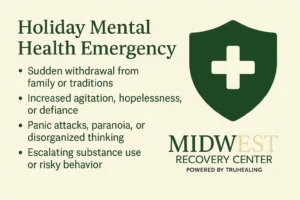When your child is in crisis, the calendar doesn’t matter. The lights, the music, the traditions—none of it softens the weight in your chest or the fear in your gut. Maybe you’ve seen them unravel before, but this time feels different. Sharper. Scarier. The holidays were supposed to be a time of connection. Instead, you’re watching someone you love slip further away—and you don’t know how to stop it.
If you’re here, reading this, it’s because something has tipped. And you’re looking for more than reassurance. You’re looking for real help. A Partial Hospitalization Program in Ohio could be the missing link between survival and true support—especially during this overwhelming time of year.
Let’s talk about what PHP is, what it isn’t, and why it’s one of the most stabilizing, family-sparing options available when everything feels like it’s falling apart.
The Holidays Can Amplify a Mental Health Crisis
It’s not “just the stress of the season.”
Families often try to white-knuckle it through the holidays, hoping things settle down after New Year’s. But for many young adults in behavioral health crisis, the holidays aren’t just emotionally tough—they’re destabilizing.
School breaks mean fewer routines. Social pressures increase. Triggers around family conflict, grief, or trauma resurface. Add to that colder weather, less daylight, and holiday drinking culture—and what you’re left with isn’t just discomfort. It’s danger.
You might see:
- Sudden withdrawal from family or traditions
- Increased agitation, hopelessness, or defiance
- Panic attacks, paranoia, or disorganized thinking
- Escalating substance use or risky behavior
- Sleep reversal or total shutdown
These aren’t just seasonal blues. They’re signs your child may be teetering on the edge of a deeper crisis—and that waiting could cause real harm.
What Is a Partial Hospitalization Program?
A Partial Hospitalization Program (PHP) is an intensive outpatient level of care designed for individuals who need structured mental health or substance use treatment—but don’t require 24/7 hospitalization.
Think of it as the clinical intensity of inpatient care with the flexibility of going home at night. Clients attend PHP 5–6 days per week, for several hours each day. They receive therapy, psychiatric support, medication management, and coping skill development in a highly structured setting.
It’s not just “more therapy.” It’s an evidence-based treatment model that meets young people at the point of instability—and helps them recalibrate before things spiral further.
PHP Includes:
- Daily group therapy and psychoeducation
- Weekly individual therapy sessions
- Family therapy or check-ins when appropriate
- Medication evaluation and monitoring
- Crisis safety planning and behavioral coaching
And perhaps most importantly—a break from chaos.
Why PHP Works During a Holiday Mental Health Emergency
When your young adult is in emotional or psychological freefall, it’s easy to feel like you’re choosing between extremes: a psychiatric hospital or “just wait and watch.” PHP offers a third path—one that’s intensive and accessible.
Here’s why it’s uniquely suited for holiday crises:
Rapid Access
While some residential programs have waitlists, Midwest Recovery’s PHP in Toledo has immediate availability—because crises don’t follow a calendar.
Daily Stability
PHP provides structure and routine, breaking cycles of chaos and disconnection. Each day builds predictability and momentum.
Family-Integrated Support
You don’t have to send them away. Clients return home each evening, allowing you to stay connected while the clinical team handles the heavy lifting.
Psychiatric Monitoring
If your child’s mood, thoughts, or behavior have become erratic, PHP allows for medical oversight—without a locked unit or full admission.
Life Skill Development
This isn’t just symptom management. PHP teaches tools for emotional regulation, communication, and safe re-entry into school or work.

What You’re Feeling Is Real—and You’re Not Alone
Parents in this position often say things like:
- “I don’t recognize my child anymore.”
- “We were just starting to rebuild—and now this.”
- “I’m terrified and exhausted. I don’t know what’s going to happen next.”
Those feelings aren’t exaggerations. They’re data points—emotional indicators that something needs to change.
One mother recently shared:
“PHP gave us all a reset. My daughter was spiraling, refusing to get out of bed, lashing out, and using again. We were headed for another hospitalization. Instead, she started PHP within days, and we finally had professionals involved again—who knew how to hold all of it. It’s the reason we made it through December.”
— Parent of PHP Client, 2023
If you’re looking for a Partial Hospitalization Program in Perrysburg, Ohio or nearby, you don’t have to wait until January. Midwest Recovery is ready now.
What Makes Midwest Recovery’s PHP Different?
We’re not just clinicians—we’re crisis-holders. We’ve walked hundreds of families through the very moment you’re in now. We know what it’s like to try to act normal around relatives while checking your phone every ten minutes, praying your child hasn’t run or relapsed.
At Midwest Recovery, we offer:
- Local access in Toledo with flexible admissions
- Compassionate clinicians who specialize in young adult care
- Dual-diagnosis treatment for co-occurring mental health and substance use
- Family support, because you need tools too
- Holiday availability, including emergency coordination
If you’re near Maumee, Ohio, our team is close, and we can act fast. You won’t get lost in a referral loop or waitlist queue.
Common Questions About PHP During the Holidays
Can my child start PHP right away, even during the holidays?
Yes. Midwest Recovery maintains admissions availability throughout the holiday season. Our team can complete assessments quickly and help your family stabilize without delay.
Does my child need to be suicidal or using drugs to qualify for PHP?
No. PHP is designed for a wide range of behavioral health concerns—mood disorders, anxiety, trauma, self-harm, or any major life disruption. Your child doesn’t need to “hit bottom” to qualify for support.
Will insurance cover PHP?
In most cases, yes. PHP is a covered service under many private insurance plans and Medicaid. Our team can verify your benefits quickly and guide you through the process.
What if my child refuses to go?
Many young adults resist care at first. Our clinicians can help with scripts, coaching, or even intervention-style conversations to encourage engagement without force.
What happens after PHP ends?
Discharge planning is built into every case. Some clients step down into an Intensive Outpatient Program (IOP); others transition back to school or work with outpatient therapy. We don’t just drop people—we build bridges.
A Final Word for Parents Who Are Holding Their Breath
You may feel like you’re walking on eggshells every day—afraid of saying the wrong thing, afraid of silence, afraid of the next outburst or disappearance. That’s not parenting. That’s survival mode. And it’s not sustainable.
You don’t have to keep hoping things get better on their own.
You can take one step that shifts the entire direction.
Ready to stabilize what feels unmanageable?
Call at (888) 657-0858 or visit the link to learn more about our Partial Hospitalization Program services in Toledo, Ohio.
We’re ready when you are—and we’ll stay steady while things feel shaky.


























